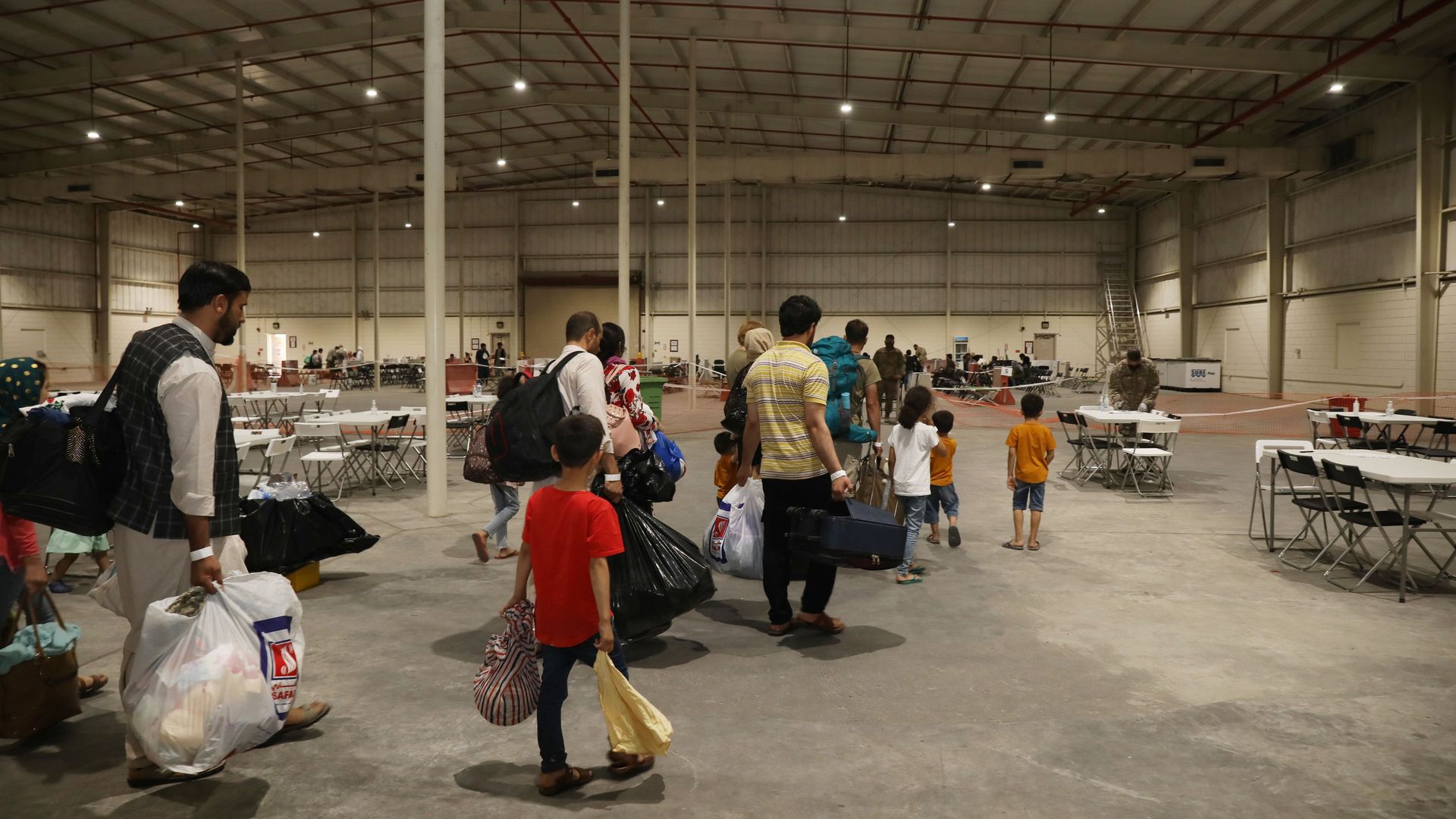Scoop: White House plans expedited resettlement for Afghan refugees
Add Axios as your preferred source to
see more of our stories on Google.

Afghan Special Immigrant Visa holders enter a processing center at Camp As Sayliyah, Qatar, last August. Photo: Sgt. Jimmie Baker/U.S. Army via Getty Images
President Biden's advisers are crafting a plan to accelerate bringing potentially thousands of Afghans to the U.S. from Qatar, according to a source with direct knowledge of the administration's internal deliberations on the subject.
Why it matters: As U.S. military leaders plan for a possible Russian invasion of Ukraine, the administration is still struggling to handle the aftereffects of its chaotic Afghanistan withdrawal. One challenge: how to care for tens of thousands of displaced Afghans — many of whom helped the U.S. fight its longest war.
- The president's senior national security and foreign policy officials are discussing an expedited refugee process.
- It would allow Afghans to be screened, vetted, approved for refugee status and placed on planes to the United States within 30 days of their arrival at the military site in Qatar being used to house them.
- It usually takes two to five years for refugee applicants to be resettled in the U.S.
Between the lines: The Department of Homeland Security, State Department and White House are considering a streamlined process.
- The administration is nearing a mid-February deadline for moving thousands of Afghan refugees in the U.S. off military bases and into their new communities.
- So far, the administration has relied on the use of humanitarian parole to rapidly resettle tens of thousands of Afghans.
- That mechanism only provides protection from deportation and the ability to work for two years. Afghans already in the U.S. then will have to go through the lengthy special immigrant visa (SIV), asylum or green-card processes to attain permanent legal status.
- Using an expedited U.S. Refugee Admissions Program process in Qatar, though, would immediately put Afghans on a pathway to green cards.
The big picture: Biden officials involved in the discussions have said they're confident the full refugee vetting process can be done in 30 days. Individual cases already are expedited in similar ways.
- The Biden team has studied the fast-track processes implemented under President Obama during the 2016 Syrian refugee crisis as an example, according to the source.
- During those efforts, 10,000 refugees were processed in under 12 weeks.
- In addition to the 30-day process, the administration also is looking into 90-day and 120-day processes as ways to update and innovate the U.S.'s refugee process overall — not just for Afghans, a White House official told Axios.
What they're saying: The administration has been working to rebuild the U.S. refugee program, a National Security Council spokesperson told Axios.
- “There is more work to do, which is why we are exploring a variety of innovations to streamline the resettlement process and eliminate redundancies, while maintaining the robust health and screening and vetting processes,” the official said.
There would still be significant obstacles to speeding up the process, including the ongoing threat from COVID-19, which is complicating travel and in-person interviews.
The Biden administration also is trying to resolve issues with a refugee resettlement operation that withered under a slowdown enacted by President Trump.
- In addition, the U.S. housing shortage has restricted the availability of new, affordable homes for Afghan families — a major hurdle for refugee agencies.
- Some Afghans also may not pass the screening process for refugee status, which would add more time.
- Officials are then forced to determine whether they are eligible to come to the U.S. through other avenues — or must be sent to a different country, according to the source.
By the numbers: More than 76,000 Afghans have been brought to the U.S. through Operation Allies Welcome, according to DHS. An additional 2,500 are waiting at transit locations overseas.
- Roughly 10,000 of those already in the U.S. are waiting at military sites, while the rest have been resettled in their new communities.
- Overall, the government is aiming to ramp up its evacuations to 2,000 Afghans per month.
- Half of them would be SIV holders or applicants rather than refugee applicants, a White House official confirmed.
What to watch: Refugee organizations and advocates have called on Congress to pass an Afghan Adjustment Act.
- It would provide quicker pathways to permanent status for Afghans already in the U.S.

